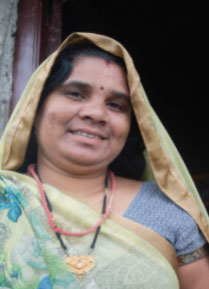WOMEN EMPOWERMENT
 “Initially, many women in the village were suspicious of me, taking me for nothing but an ambitious saleswoman. To set their minds at ease, I shared my own experience of using a cloth during menstruation, instead of a sanitary pad and how inconvenient and unhygienic it was for me. This helped build their faith and trust in me.” Kavita Baghel looks serenely happy as she shares the story of how she took her life into her own hands and turned it around. It is a story that has set an example for the other women in her village.
“Initially, many women in the village were suspicious of me, taking me for nothing but an ambitious saleswoman. To set their minds at ease, I shared my own experience of using a cloth during menstruation, instead of a sanitary pad and how inconvenient and unhygienic it was for me. This helped build their faith and trust in me.” Kavita Baghel looks serenely happy as she shares the story of how she took her life into her own hands and turned it around. It is a story that has set an example for the other women in her village.
Kavita comes from a farming family. Living in Amaljhuma village in Dhar district of Madhya Pradesh, her family and her brother-in-law’s family jointly owns three acres of land on which they grow cotton, maize and wheat. Kavita and her family members also work for wages in the field of other farmers. Besides this, she is also part of the Sita Mata Self-Help Group (SHG) in the village.
When Kavita attended the P.A.C.E. training, made possible by the Women + Water Alliance, she was hugely impressed with the WASH lessons. Not only was she keen to adopt sanitary napkins for herself, she was also struck by the idea of manufacturing napkins to sell to other women in the village, who were using a piece of cloth during their periods. Compared to reusable pads, cloth is often not recommended for maintaining menstrual hygiene. Kavita figured that with the high number of women in the village, it would be a sustainable business.
The P.A.C.E. training brought out the entrepreneur in Kavita. She learned how to make sanitary napkins from a skilled group that was making them under the National Rural Livelihoods Mission (NRLM). The challenge was that there was nobody in the village to help her with her work.
“I was buying sanitary pads from the market for Rs.48, which was turning out to be expensive for me. However, the packets of sanitary pads that I got from the SHG that the NRLM introduced me to cost me only Rs.25,” tells Kavita.
So, rather than manufacturing the sanitary pads, Kavita started procuring them for Rs.25 and selling them to 150 women in the village at Rs.30 a packet.
“It was the P.A.C.E. training offered by CARE India that helped me realise that this was a unique opportunity to tap into. We women in the village did not even know about sanitary napkins. And now I am equipped to market and sell them in the village,” shares Kavita. She now saves up to Rs.1000 by selling the sanitary pads, sometimes even Rs.1,500.
Now that Kavita has a captive market, she sells door-to-door, introducing women who were not part of the P.A.C.E. training to the sanitary pads.
To add to her efforts, CARE India introduced her to other P.A.C.E. cohorts in the neighbouring villages. She also sells to women in the neighbouring villages of Konda, Susari and Heldad, where the market is slowly expanding.
These villagers come from very small-scale farming families and do not have the capacity to spend on expensive sanitary pads. The low prices that Kavita is selling them at make them affordable.
Leveraging what she learned in the communication and negotiation modules of P.A.C.E., Kavita is now bargaining with the manufacturers to give her a better margin. “The current margin is just Rs.5 for a packet of sanitary pads. I have put in so much work to create a market for their products, I deserve a better margin,” says she, adding that at present, she sells pads to about 300 women in her village and in neighbouring villages.
On the request of the village panchayat, Kavita addressed a gathering of village women on the use of sanitary pads on International Women’s Day on March 8. Like a good businesswoman, she has a target in mind. “I want to make every woman in my village and all neighbouring villages aware of the benefits of using sanitary pads.”
“If it was not for my P.A.C.E. training by CARE India, I would have still been a housewife, with no way of realising my own entrepreneurial potential. I am so grateful.”
About the Programme: CARE is working with USAID and Gap Inc. as a partner of the ambitious Women + Water Alliance (W+W) to improve and sustain the health and well-being of 2,00,000 women, their households and communities touched by the apparel industry. The programme is designed on the premise that by providing access to water, inculcating sanitation and hygiene (WASH) practices and sharing water resources in a sustained and equitable manner, women will be able to significantly improve their health and wellbeing.
Posted by: Priyank Verma, KMLE Expert
Location: Amaljhuma village, Nisarpur Block, Dhar district, Madhya Pradesh
In 2022, for International Women’s Day (IWD), the UN has adopted the theme ‘Gender equality today for a sustainable tomorrow’, to celebrate the tremendous efforts by women and girls around the world in shaping a more equal future and recovery from the COVID-19 pandemic.




